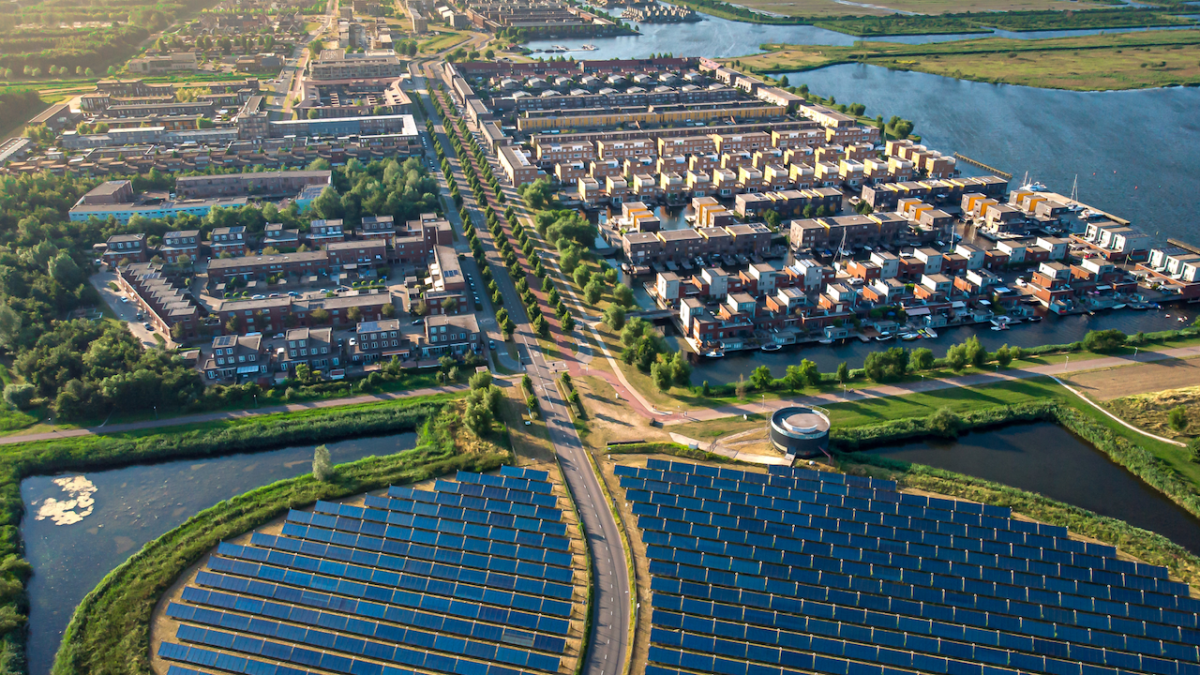Moving From Sustainability Talk to Action
With sustainability promises made, and target dates looming, it's time for real progress.

Originally published on Black & Veatch Insights
By Ajay Kasarabada, P.E, AVP and Director – Environmental Solutions, Black & Veatch
Anyone who’s been in the commercial and industrial business for a while is familiar with the usual sustainability topics: why it’s important, decarbonization and sustainability concepts, and how to set goals. This was only my second time attending GreenBiz23, the premier conference for sustainability executives held in February in Scottsdale, Arizona. After seeing some of the same people from other distributed energy and environmental conferences in the audience, I noticed the orbits and goals aligning.
The Greenbiz23 conference marked a clear shift to action. At this event, I noticed three themes, pathways to achieving sustainability and net zero goals, emerge.
1. Land Use for Decarbonization Needs Rethinking
Decarbonization requires a huge change in how electricity is generated, transmitted, distributed, used, and stored. There was no talk of nuclear, so inevitably all the green electrons are going to be generated by renewables (solar, wind, and transition fuels, such as natural gas blended with hydrogen and carbon capture, and eventually 100% hydrogen combustion). What does this mean from a land-use perspective? It's all about acreage and location when it comes to generating electrons, and it's all about location and geology when it comes to carbon sequestration. Policy questions arise – is the solution to decarbonization covering the land with solar panels? Can large acreage land use be shared among crops, animals, and solar panels? Is it more carbon-intensive to grow corn for ethanol versus using the same land area to generate green electrons? How do we balance environmental considerations with large renewable developments? These are the questions we'll ask, and the decisions we'll face.
2. Climate is Water, and Decarbonization Requires Water
A third of the global population today resides in a water-stressed environment, and it is only getting worse. Prolonged droughts, frequent floods, sea level rise, and drying rivers and lakes are climate change consequences. While some cities and municipalities are relying on federally funded mechanisms, such as Infrastructure Investment and Jobs Act (IIJA), to address water challenges, the private sector is increasingly bringing water into their corporate social responsibility actions. Water is key for survival. Investments and commitments made to enhance water supply, water restoration, and destressing water basins demonstrate corporate social responsibility. Large industrial companies are funding and building projects on the ground to improve water resiliency. They are looking at not only the physical cost of water for operations, but also the value chain water cost. This is how they are walking the talk when it comes to responsible water usage, by promoting "water positive" concepts.
Many bets are being placed on hydrogen. Green hydrogen is touted as the next big thing for a decarbonized ecosystem; however, green hydrogen production requires water for electrolysis and cooling. Using water for hydrogen presents a public policy issue related to water usage priorities, including human consumption versus industrial consumption, irrigation or hydrogen production, climate justice (whose water rights are we tapping into?), water sourcing (where do we get the water from?) and rates (cost of drinking water versus water used for hydrogen). From a technical standpoint, water will need to be moved to where the green electrons are generated, or the green electrons moved to a location with an adequate water supply. This ties to land use as well as environmental consequences and permitting needed for large-scale projects. The water conundrum, as it relates to green hydrogen production, is yet to be debated fully since discussions are mainly focused on hydrogen technologies, and water is not yet at the forefront. Addressing water and relevant environmental issues for green hydrogen production will allow developers to take full advantage of federal incentives, such as the Inflation Reduction Act (IRA), for clean energy development.
3. Supply Chain is a Triple-Bottom-Line Issue
The triple bottom line is a framework to measure the benefit to the people, planet, and monetary outcome (profit). Some sessions focused on Scope 3 emissions toward a net-zero future, supplier diversity, and supply chain wherewithal to provide components to large decarbonization projects, especially with made-in-the-USA government funding requirements.
Why is this a triple-bottom-line issue? From the planet's side of things, companies are looking at their supply chains not only to decarbonize their processes but also to use water sustainably. For companies, this is a physical, regulatory, and reputational risk if their supply chains are not toeing the line.
Net zero also means that the supply chain emissions will need to be factored into the overall algebraic sum of Scope 1, 2, and 3 emissions, respectively. Most companies have figured out their Scope 1 and 2 emissions, but Scope 3 became a can kicked down the road. That road has hit a dead end, and now net-zero commitment target dates are 10-15 years away. If changes in suppliers, investments in projects to decarbonize the suppliers (upstream and downstream), and methods to track and verify these reductions do not happen quickly, then these commitments will slip.
From a people side, supply chains consist of small manufacturers, Women Business Enterprise (WBE), Small Business Enterprise (SBE), and Minority Business Enterprise (MBE), which hire local talent. Companies are looking to invest in these supplier databases to ensure they decarbonize and thus can contribute to Scope 3 reductions. It's also about profit. Hiring a diverse supplier base, and investments made to decarbonize them, result in creditable carbon insets that help with the net-zero math and in market capture opportunities with a customer base that is increasingly educated about the circular economy and sustainability.
Continued industry alignment to discuss and solve these issues, and a host of others, is vital to our progress. The path to sustainability and decarbonization outcomes is winding and complex. Companies like Black & Veatch work with multiple solutions, across all sectors, and can help businesses evaluate the costs, options, and risks for a cost-efficient path to a sustainable, resilient future.
Need help reaching your sustainability and decarbonization goals? Contact our experts to review plans and create next steps.

